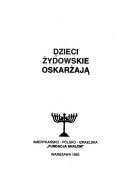File:1947 Hochberg - Grüss.jpg
1947_Hochberg_-_Grüss.jpg (128 × 184 pixels, file size: 3 KB, MIME type: image/jpeg)
Title
Maria Hochberg-Marianskwa - Noe Grüss, eds. Dzieci Oskarzaja. Cracow-Łódź-Warsaw: Central Jewish Historical Commission in Poland, 1947 <Polish>.
Translations
- English ed. The Children Accuse (London: Vallentine-Mitchell, 1996)
Abstract
"This most unusual book contains evidence collected by the author in 1945 in Poland from children and teenagers who surfaced from hiding in forests and bunkers and told the story of their survival as it happened. The interviews, expertly translated from the original Polish, document life in the ghettos, the camps, in hiding, in the resistance and in prison. There is also a series of interviews with adults who lived and worked alongside children in wartime Poland."--Publisher description.
"Dzieci oskarz˙aja˛, contained the recollections of fifty-three children organized thematically into chapters: “The Ghettos,” “The Camps,” “On the Aryan side,” “In Hiding," “The Resistance,” and “Prison.” In her thirty-two-page foreword, Hochberg gave an overview of the Jewish child’s experience under Nazi rule and after liberation. Unlike Ehad me-ir, Dzieci oskarz˙aja˛ included a chapter of essays and testimonies by adults concerning the life and death of Jewish children during the Holocaust ... The book was not only a work of commemoration, but also a protest against non-Jewish Polish society’s attitude towards the Jews. There could be no better example of the pervasiveness of this attitude than many Poles’ negative reaction to the rescuers of innocent Jewish children."--Boaz Coen
About the Authors
Maria (Miryam) Hochberg-Marianska survived the war living outside the ghetto “on Aryan papers” (that is, using false identity documents indicating that she was not Jewish). She was active in Zegota, the Polish underground organization for assistance to Jews, and cared for a number of women who went into hiding with their children. Thus, she had firsthand knowledge of the special needs of children during the occupation.
Noe Gruss before the war was a teacher in Rovno’s Hebrew gymnasium. He was one of the founding members of the Jewish Historical Commission in Poland and an expert on children’s testimonies. As early as 1945, he was lecturing to the Commission’s staff on “The Psychology of Jewish Youth in Light of Existing Archival Materials.”
File history
Click on a date/time to view the file as it appeared at that time.
| Date/Time | Thumbnail | Dimensions | User | Comment | |
|---|---|---|---|---|---|
| current | 07:07, 22 February 2022 |  | 128 × 184 (3 KB) | Gabriele Boccaccini (talk | contribs) |
You cannot overwrite this file.
File usage
The following page uses this file:
